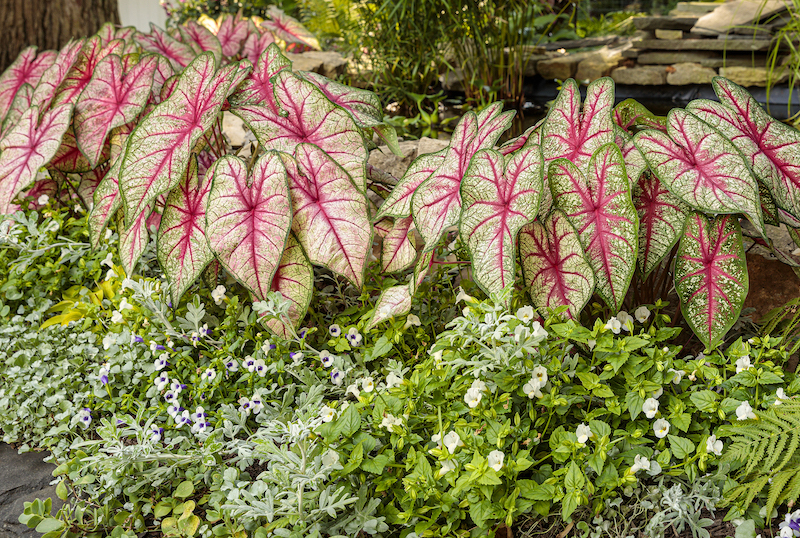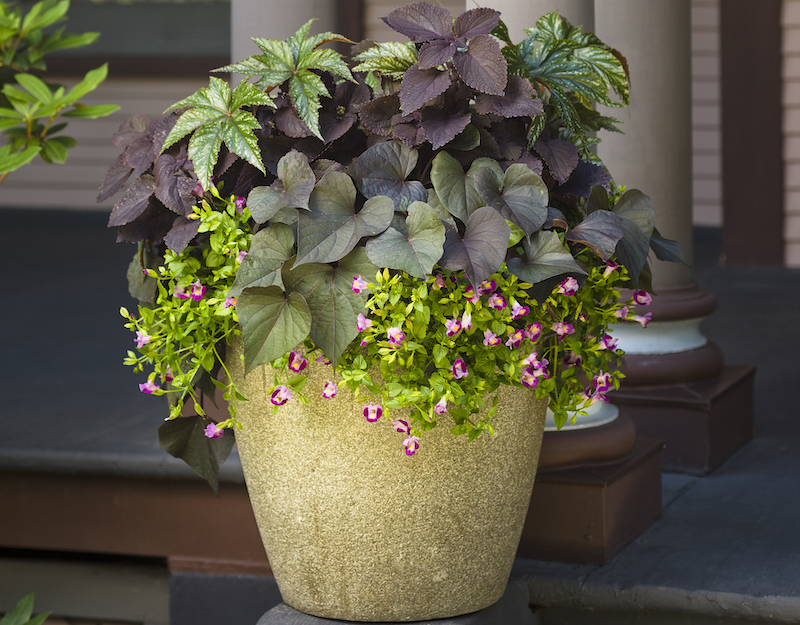Torenia, more commonly called wishbone flowers, are tender tropical perennials perfect for planting in pots, hanging baskets, and as a finishing touch to any garden bed. Wishbone flowers are sold in most gardening zones as an annual that blooms quite heavily from early spring until the first fall frost. These lovely, low-growing plants flower best in partly shaded spots in the garden but will tolerate 4-6 hours of full sun either in the early morning or late afternoon.
Wishbone flowers require well-draining soil that retains moisture to thrive. Light applications of fertilizer every month are sufficient for healthy growth and continued flowering. Water with a diluted liquid formulation of seaweed or fish emulsion that has an NPK ratio similar to 2-3-1 to keep the foliage and flowers colorful and lush. Torenias stay compact and make great edging plants at the front of a mixed cottage garden border. They also work well as a filler in container arrangements, or as a temporary groundcover and lower story plant in a woodland setting.

Shrubs To Plant With Torenia
Using annual plants as a temporary groundcover is a great way to add a patch of color under heavy tree canopies or hedges. Torenias tolerate heavy shade and look great planted under hydrangea, viburnum, mountain laurel, pieris, camellia, and azaleas. Their bright and cheerful flowers also grow well in partly sunny locations alongside dogwood, sweetshrub, and abelia, keeping color in the garden bed long after the shrubs have finished blooming.
Perennials To Plant With Torenia
Perennial borders can provide 12 months of interest with their flowers and seedheads. Planting wishbone flowers at the base of taller plants is a great way to disguise any naked stems or leggy growth. An edging of Torenia flowers would complement ornamental grasses, artemisia, and caladium fill in any gaps.
Early blooming perennials often die back by early summer when the days become hotter. Wishbone flowers can be planted as either camouflage or a filler for daffodils, snowdrops, checker lilies, and bleeding hearts. The foliage of shady perennials, such as hostas, ferns, ajuga, and astilbe, makes a lovely backdrop for torenia flowers. Select colors in white, blues, and soft reds for a calm, relaxing feel.
Annuals To Plant With Torenia
Torenia tolerates the cooler temperatures of early spring, making it one of the earliest annuals to plant in a sheltered spot or a pot that can be moved when extended nights of frost are forecasted. Other early annuals like pansies, violas, coleus, or impatiens look fabulous paired with wishbone flowers. Foliage-forward annuals like sweet potato vine, annual euphorbia, and angel wing begonias provide a stunning backdrop for the subtle colors of torenia.
Adding a slow-release, granular fertilizer at the time of planting helps to keep annual flower beds looking good with little extra maintenance. Feed the plants in the spring and again in July to guarantee a long season of foliage and flowers.
Best Companion Plants For Torenia in Containers
Torenias are the perfect filler element in planters and hanging baskets. Their shallow roots and compact growth habit make them well-behaved companions for many fillers and thriller plants. Torenia combines well with strong-colored foliage like angel wing begonia, sweet potato vine, and coleus with a brightly colored wishbone flower trailing over the side to soften any hard edges of the planter.

Plants Not To Grow With Torenia
Avoid planting wishbone flowers with aggressively spreading or suckering plants like lilacs, raspberry shrubs, or any variety of squash vine. These rampant growers would overwhelm the more dainty wishbone flowers. Drought-tolerant plants are also not a great match for areas near torenias. Torenias need consistent moisture at their roots to thrive and cannot tolerate extended drought.
Best Plants To Grow With Torenia
Torenias are very effective in a garden border planted as a low-growing and colorful edging plant. Plants that prefer shady spots in the garden are the best choices to pair with this versatile plant. A combination of caladiums, artemisia, and dichondra are all beautifully set off when edged with multiple colors of wishbone flowers.
 |
Author Robbin Small - Published 10-14-2023 |


